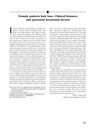 11 citations,
January 2001 in “Cambridge University Press eBooks”
11 citations,
January 2001 in “Cambridge University Press eBooks” Androgens can cause hair growth in some areas but hair loss on the scalp.
 39 citations,
January 2008 in “Journal of Endocrinology”
39 citations,
January 2008 in “Journal of Endocrinology” SCF and c-Kit decrease in AGA hair follicles, possibly affecting hair pigmentation and growth.
 14 citations,
November 2013 in “PloS one”
14 citations,
November 2013 in “PloS one” HGF/SF increases skin melanocytes but doesn't change melanin type or amount.
 69 citations,
April 2010 in “Dermatologic Surgery”
69 citations,
April 2010 in “Dermatologic Surgery” Bimatoprost is a safe and effective treatment for making eyelashes longer, thicker, and darker.
 203 citations,
December 2004 in “Journal of The American Academy of Dermatology”
203 citations,
December 2004 in “Journal of The American Academy of Dermatology” Early diagnosis and treatment, using finasteride, minoxidil, or hair transplantation, improves hair loss outcomes.
 45 citations,
November 2015 in “Dermatologic Clinics”
45 citations,
November 2015 in “Dermatologic Clinics” Hormones might affect the skin condition hidradenitis suppurativa, but their exact role is unclear.
 41 citations,
June 2016 in “Reviews in endocrine and metabolic disorders”
41 citations,
June 2016 in “Reviews in endocrine and metabolic disorders” Hidradenitis suppurativa may be related to hormones and patients often have metabolic disorders; more research is needed to understand this connection.
30 citations,
October 2020 in “Frontiers in Plant Science” Combined arsenic and low oxygen stress alters root growth to help plants absorb nutrients.
 14 citations,
September 2014 in “Journal of Pediatric and Adolescent Gynecology”
14 citations,
September 2014 in “Journal of Pediatric and Adolescent Gynecology” Irregular menstrual cycles in teenagers are linked to a higher risk of polycystic ovary syndrome and metabolic syndrome.
 11 citations,
January 2014 in “CellBio”
11 citations,
January 2014 in “CellBio” Sex steroids, especially progesterone, can slow down the growth of mouse melanoma cells.
 68 citations,
June 2005 in “Expert Opinion on Therapeutic Targets”
68 citations,
June 2005 in “Expert Opinion on Therapeutic Targets” Oestrogens help maintain healthy skin, heal wounds, and may protect against skin aging and cancer.
 2 citations,
January 2015 in “Springer eBooks”
2 citations,
January 2015 in “Springer eBooks” Environmental factors and exposure to toxins may contribute to male infertility by affecting sperm and hormone function.

research Acne
2 citations,
May 2011 in “Harper's Textbook of Pediatric Dermatology” Acne is a common skin condition linked to diet, hormones, and genetics, and early treatment can prevent scarring.
 1 citations,
July 2023 in “Horticulture research”
1 citations,
July 2023 in “Horticulture research” Tiny RNA molecules help control the growth of plant hairs.
 3 citations,
December 2016 in “KSBB Journal”
3 citations,
December 2016 in “KSBB Journal” The herbal medicine promotes hair growth and could be an effective treatment.
 39 citations,
January 2013 in “Indian Journal of Dermatology, Venereology and Leprology”
39 citations,
January 2013 in “Indian Journal of Dermatology, Venereology and Leprology” Eating high glycemic foods and drinking milk may worsen acne by increasing insulin and IGF-1 levels.
 6 citations,
May 2020 in “JAMA Ophthalmology”
6 citations,
May 2020 in “JAMA Ophthalmology” Using 5-alpha-reductase inhibitors, drugs for prostate issues and hair loss, may lead to eye abnormalities in men.
 February 2024 in “Journal of Education, Health and Sport”
February 2024 in “Journal of Education, Health and Sport” Different treatments for PCOS should be tailored to the individual, including lifestyle changes and various medications.
 3 citations,
January 2017 in “Journal of cosmetology & trichology”
3 citations,
January 2017 in “Journal of cosmetology & trichology” The food supplement with L-cystine, Serenoa repens extract, and biotin safely reduced hair loss and improved hair growth in men and women.
16 citations,
November 2018 in “The journal of pain/Journal of pain” 14,15-EET may help reduce poststroke pain by affecting certain brain proteins.
103 citations,
December 2021 in “Journal of biological rhythms” Shift work disrupts the body's natural clock, leading to health problems.
 September 2024 in “Advanced Biomedical Research”
September 2024 in “Advanced Biomedical Research” Auriculotherapy and Aslagh capsules are as effective as metformin for treating PCOS symptoms, with auriculotherapy slightly better for reducing hair growth.
63 citations,
May 2009 in “Dermato-endocrinology” Increased FGFR2b signaling, influenced by androgens, plays a role in causing acne.
 10 citations,
September 2001 in “Journal of The American Academy of Dermatology”
10 citations,
September 2001 in “Journal of The American Academy of Dermatology” Hormonal factors may affect female hair loss, needing further research and treatment ideas.
466 citations,
June 2009 in “Experimental dermatology” We now understand more about what causes acne and this could lead to better, more personalized treatments.
Cyproterone acetate is an effective treatment for women with acne, hair loss, and excessive hair growth.
November 2024 in “European Journal of Pharmacology” MitoQ may help treat hair loss by boosting hair growth pathways.
January 2019 in “Springer eBooks” Sebaceous glands play a key role in skin health and conditions like acne.
 December 2015 in “Вестник дерматологии и венерологии”
December 2015 in “Вестник дерматологии и венерологии” Men with male pattern baldness may not have different hormone levels, but their hair follicles are likely more sensitive to hormones.
6 citations,
November 2018 in “Journal of molecular histology” Testosterone increases fluid secretion and aquaporin expression in the vas deferens, which is important for male fertility.





















